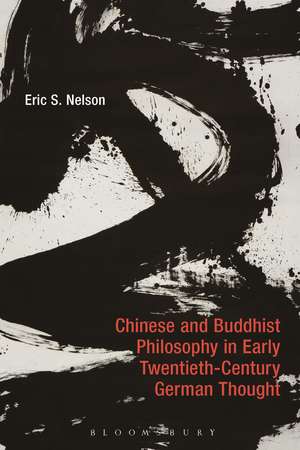Chinese and Buddhist Philosophy in Early Twentieth-Century German Thought
Autor Professor Eric S. Nelsonen Limba Engleză Paperback – 20 feb 2019
| Toate formatele și edițiile | Preț | Express |
|---|---|---|
| Paperback (1) | 233.99 lei 6-8 săpt. | |
| Bloomsbury Publishing – 20 feb 2019 | 233.99 lei 6-8 săpt. | |
| Hardback (1) | 776.49 lei 6-8 săpt. | |
| Bloomsbury Publishing – 23 aug 2017 | 776.49 lei 6-8 săpt. |
Preț: 233.99 lei
Preț vechi: 298.75 lei
-22% Nou
Puncte Express: 351
Preț estimativ în valută:
44.79€ • 46.07$ • 37.16£
44.79€ • 46.07$ • 37.16£
Carte tipărită la comandă
Livrare economică 19 februarie-05 martie
Preluare comenzi: 021 569.72.76
Specificații
ISBN-13: 9781350101043
ISBN-10: 1350101044
Pagini: 360
Dimensiuni: 156 x 234 x 19 mm
Greutate: 0.5 kg
Editura: Bloomsbury Publishing
Colecția Bloomsbury Academic
Locul publicării:London, United Kingdom
ISBN-10: 1350101044
Pagini: 360
Dimensiuni: 156 x 234 x 19 mm
Greutate: 0.5 kg
Editura: Bloomsbury Publishing
Colecția Bloomsbury Academic
Locul publicării:London, United Kingdom
Caracteristici
Explores the issues of intercultural interpretation and the idea of philosophy through an analysis of the reception of Chinese and Buddhist philosophy in early twentieth-century German philosophy
Notă biografică
Eric S. Nelson is Associate Professor of Philosophy at Hong Kong University of Science and Technology, Hong Kong. He has published over seventy articles and book chapters on Chinese, German, and Jewish philosophy.
Cuprins
Introduction1. A Peculiar Journey: Confucian Philosophy in German Thought2. The Problem of Life in China and Europe: Zhang Junmai, Eucken, and Driesch3. Resentment and Ressentiment: Nietzsche, Scheler, and Confucian Ethics4. Technology and the Way: Daoism in Buber and Heidegger5. Heidegger, Misch, and the "Origins" of Philosophy6. Phenomenology, Eurocentrism, and Asia: Husserl and Heidegger7. Encounter, Dialogue, and Learning: Martin Buber and Zen Buddhism8. Nothingness, Language, Emptiness: Heidegger and Chan BuddhismConclusion: Toward an Intercultural PhilosophyBibliographyIndex
Recenzii
Nelson's Chinese and Buddhist Philosophy in Early Twentieth-Century German Thought is one of the most refined intercultural inquiry into modern and contemporary German philosophers' Eurocentric tendencies (from Hegel to Heidegger) as well as counter-tendencies (from Leibniz to Buber) that one can read today.
Books like this are always needful as we hopefully deconstruct and pluralize the grounds of philosophical activity. In these days of resurgent nationalism, global stupidity, ecological and economic crisis, and the ongoing siege against the humanities and philosophical discourse, this book feels especially needful and welcome . I would then offer the author nine bows of gratitude for this immensely valuable service on behalf of the rebirth of philosophy for all peoples, perhaps even all sentient beings, past, present, and future.
Eric Nelson's book has the great merit of drawing our attention to the experiences of some great forerunners in intercultural philosophy in Weimar Germany from the end of World War I to the rise of National Socialism in 1933. Nelson's book is not merely a work on some historical episodes of intercultural philosophy but also a work showing the how of intercultural philosophy in itself . [A] very rich and detailed reconstruction of the intercultural openings undertaken by German philosophers.
Nelson shows great erudition in bringing together a wide variety of thinkers from both East and West, including importantly some lesser known, but very relevant thinkers from both the Western tradition and Eastern philosophy.
This book offers lots of valuable information and entries for further research. It is well-written and has all the tools for easy reference and an impressive bibliography.
A remarkably well-researched, thoughtful, and timely book. Its content lives up to its informative and wonderfully provocative title ... One of Nishitani's central claims is that nihilism can be overcome only by way of stepping back all the way through it ... we can thank Nelson for reintroducing us to this insight and for demonstrating how to heed it.
The breadth of Nelson's knowledge and the deftness with which he winds his way through so many figures and their respective conceptual vocabularies is mesmerizing ... a book unlike any other [which] raises the bar for anyone who teaches or writes comparative philosophy.
This book is a revelation, tracing how ideas have traveled more than we have generally recognized. The dialogues between east and west have often been interpreted primarily as a one way exchange about how the East has learned from the West. It is time to appreciate the ways in which multiple journeys have occurred and how Eastern thought has, as a matter of fact, informed and been taken up in Western thought, particularly in German philosophy as illustrated in this work. This book is one of a kind and exemplifies all that we need to engage, to learn, and to become philosophers in the twenty-first century.
In this groundbreaking study, Eric S. Nelson examines the impact of Chinese and Buddhist Philosophy on 20th Century German Thought. Through illuminating chapters on Buber, Heidegger, Misch, and others, Nelson sheds a unique light on the development of German Philosophy in the 20th Century, as well as on contemporary Comparative philosophy. This is an original and important work which reveals the influence of Asian Philosophy on Contemporary Continental thought, and which opens new perspectives for intercultural and comparative philosophy.
This is a landmark study in comparative thought. By tracing Chinese and Japanese influences on modern German philosophy, Eric S. Nelson examines a pressing question of our troubled times: is there a common ground for universal wisdom? Is there a path forward? Perhaps the most satisfying outcome of this book is that the careful consideration of Asian sources sheds light on the ideas in Heidegger's later work. By explaining how these influences clarify key contentions in German philosophy, Nelson breaks new ground.
Nelson has written an important ... riveting book.
Books like this are always needful as we hopefully deconstruct and pluralize the grounds of philosophical activity. In these days of resurgent nationalism, global stupidity, ecological and economic crisis, and the ongoing siege against the humanities and philosophical discourse, this book feels especially needful and welcome . I would then offer the author nine bows of gratitude for this immensely valuable service on behalf of the rebirth of philosophy for all peoples, perhaps even all sentient beings, past, present, and future.
Eric Nelson's book has the great merit of drawing our attention to the experiences of some great forerunners in intercultural philosophy in Weimar Germany from the end of World War I to the rise of National Socialism in 1933. Nelson's book is not merely a work on some historical episodes of intercultural philosophy but also a work showing the how of intercultural philosophy in itself . [A] very rich and detailed reconstruction of the intercultural openings undertaken by German philosophers.
Nelson shows great erudition in bringing together a wide variety of thinkers from both East and West, including importantly some lesser known, but very relevant thinkers from both the Western tradition and Eastern philosophy.
This book offers lots of valuable information and entries for further research. It is well-written and has all the tools for easy reference and an impressive bibliography.
A remarkably well-researched, thoughtful, and timely book. Its content lives up to its informative and wonderfully provocative title ... One of Nishitani's central claims is that nihilism can be overcome only by way of stepping back all the way through it ... we can thank Nelson for reintroducing us to this insight and for demonstrating how to heed it.
The breadth of Nelson's knowledge and the deftness with which he winds his way through so many figures and their respective conceptual vocabularies is mesmerizing ... a book unlike any other [which] raises the bar for anyone who teaches or writes comparative philosophy.
This book is a revelation, tracing how ideas have traveled more than we have generally recognized. The dialogues between east and west have often been interpreted primarily as a one way exchange about how the East has learned from the West. It is time to appreciate the ways in which multiple journeys have occurred and how Eastern thought has, as a matter of fact, informed and been taken up in Western thought, particularly in German philosophy as illustrated in this work. This book is one of a kind and exemplifies all that we need to engage, to learn, and to become philosophers in the twenty-first century.
In this groundbreaking study, Eric S. Nelson examines the impact of Chinese and Buddhist Philosophy on 20th Century German Thought. Through illuminating chapters on Buber, Heidegger, Misch, and others, Nelson sheds a unique light on the development of German Philosophy in the 20th Century, as well as on contemporary Comparative philosophy. This is an original and important work which reveals the influence of Asian Philosophy on Contemporary Continental thought, and which opens new perspectives for intercultural and comparative philosophy.
This is a landmark study in comparative thought. By tracing Chinese and Japanese influences on modern German philosophy, Eric S. Nelson examines a pressing question of our troubled times: is there a common ground for universal wisdom? Is there a path forward? Perhaps the most satisfying outcome of this book is that the careful consideration of Asian sources sheds light on the ideas in Heidegger's later work. By explaining how these influences clarify key contentions in German philosophy, Nelson breaks new ground.
Nelson has written an important ... riveting book.













